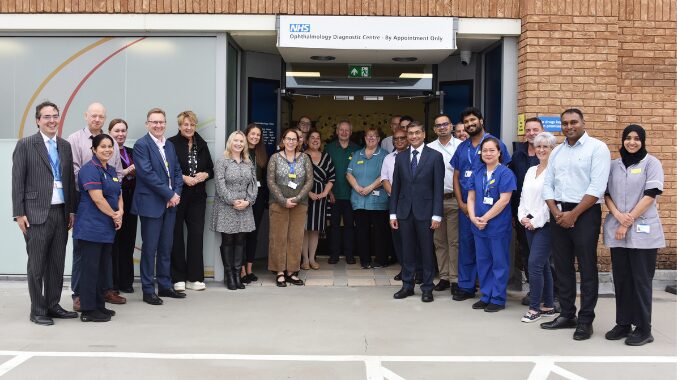
Spotlight
Yeovil ophthalmology injection suite officially opens
A brand new NHS eye treatment service has officially opened last week (Thursday 18 September) at the ophthalmology diagnostic centre in Yeovil Town Centre.
The service, run by our trust, began seeing patients earlier this month, and will treat around 30 people a day with wet age-related macular degeneration, as well as those with diabetic macular oedema – a condition that’s a serious complication of diabetes, where high blood sugar levels damage retinal blood vessels.
Over the last five years there has been a growing demand for the treatment of macular conditions in Somerset, because of an increasing elderly population, poorer health outcomes and better diagnostic equipment.
With this treatment only previously available for Yeovil patients at the Yeatman Hospital across the border in Dorset, and most recently from the busy outpatient department at Yeovil Hospital, the opening marks the first time patients can be treated for these conditions in the community.
It follows the opening of a similar treatment service at the ophthalmology diagnostic centre just off the M5 in Taunton – both of which were planned well ahead of the government’s 10 Year Plan that aims to shift more NHS services from acute hospitals to the community.
Anna Bateman, our ophthalmology lead nurse in Yeovil, says: “It’s great news that we’re able to open this service, as patients will no longer need to visit Yeovil Hospital for this treatment.
“It’s a good example of how we’re shifting services from acute to community in line with the government’s 10 Year Plan for the NHS.
“The service is generally for new patients, referred by their optometrist or our diabetic screening team because they have distorted vision, such as seeing wiggly lines, as this means they’re likely to have lost central vision. It’s also for those patients who are already receiving treatment.
“We’re also running a clinical research study from the centre, called Eye Neon, which investigates the likelihood of wet age-related macular degeneration (Wet AMD) developing in both eyes.
“We are so excited to move, not because we want to leave our colleagues at the hospital behind of course, but it will just bring our service closer to our patients, and we even have room to expand if we need to.
“The new treatment space is located at the back of the Yeovil Ophthalmology Diagnostic Centre, which is in the former Monsoon store…or Littlewoods for those who can remember that far back!
“It’s in a really handy location because it has both a front and back entrance, so patients can access it from either side of the Quedam Centre, particularly useful for those who are being dropped off.
“Our ophthalmology diagnostic centre was purpose-built for people with sight loss, and we’ve worked closely with our colleagues at the RNIB to ensure it’s in line with accessibility standards, such as having a small footprint, easy-to-read signage, and individualised care. We have two purpose-built vision lanes, which are much more of a private space for patients.
“In fact, when talks began about the move of our treatment service, we walked a patient’s journey from the car park to treatment rooms we’ve used at all three locations.
“The total footsteps are less than 100 for the new injection suite, which is a vast improvement on 600 steps from the car park to the outpatient eye clinic at Yeovil Hospital, and 1,200 steps at the Yeatman Hospital – neither of which are ideal for people with sight loss.”
Mr Paritosh Shah, one of our consultant ophthalmologists at Yeovil Hospital, adds: “I want to say a huge thank you to everyone who made this happen.
“Having a dedicated space for eye injections will greatly improve patient experience and will also ready us for the inevitable future increase in the demand on this service.
“A special thanks should also go to the League of Friends of Yeovil Hospital for their generosity, which helped us to buy some of the equipment.”
Jackie Henderson, chair of the Yeovil Hospital League of Friends, adds: “We’re really thrilled to be able to help the ophthalmology service with the purchase of equipment for treating wet macular degeneration.
“When Mr Shah presented his case to our committee, it was clear that this was a project which was very worthy of our support, and it was a unanimous decision to support his request.”

